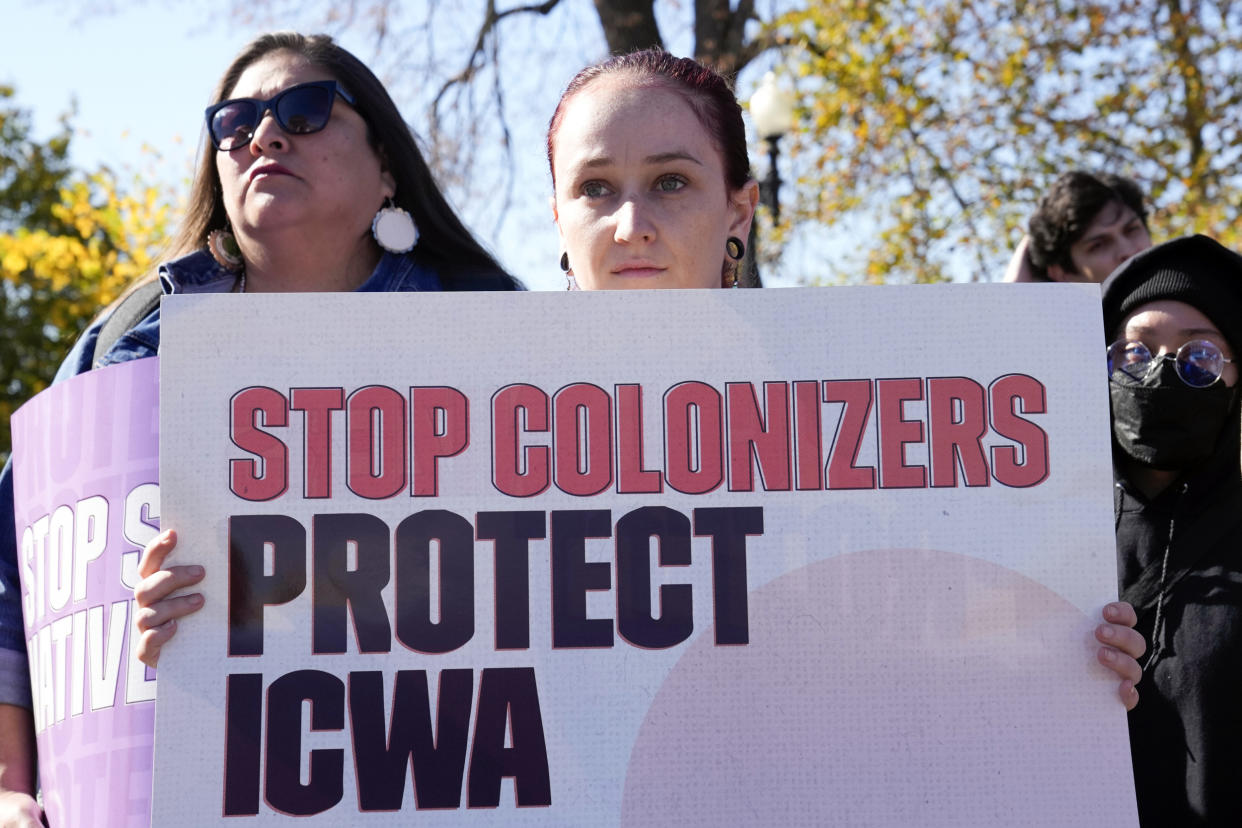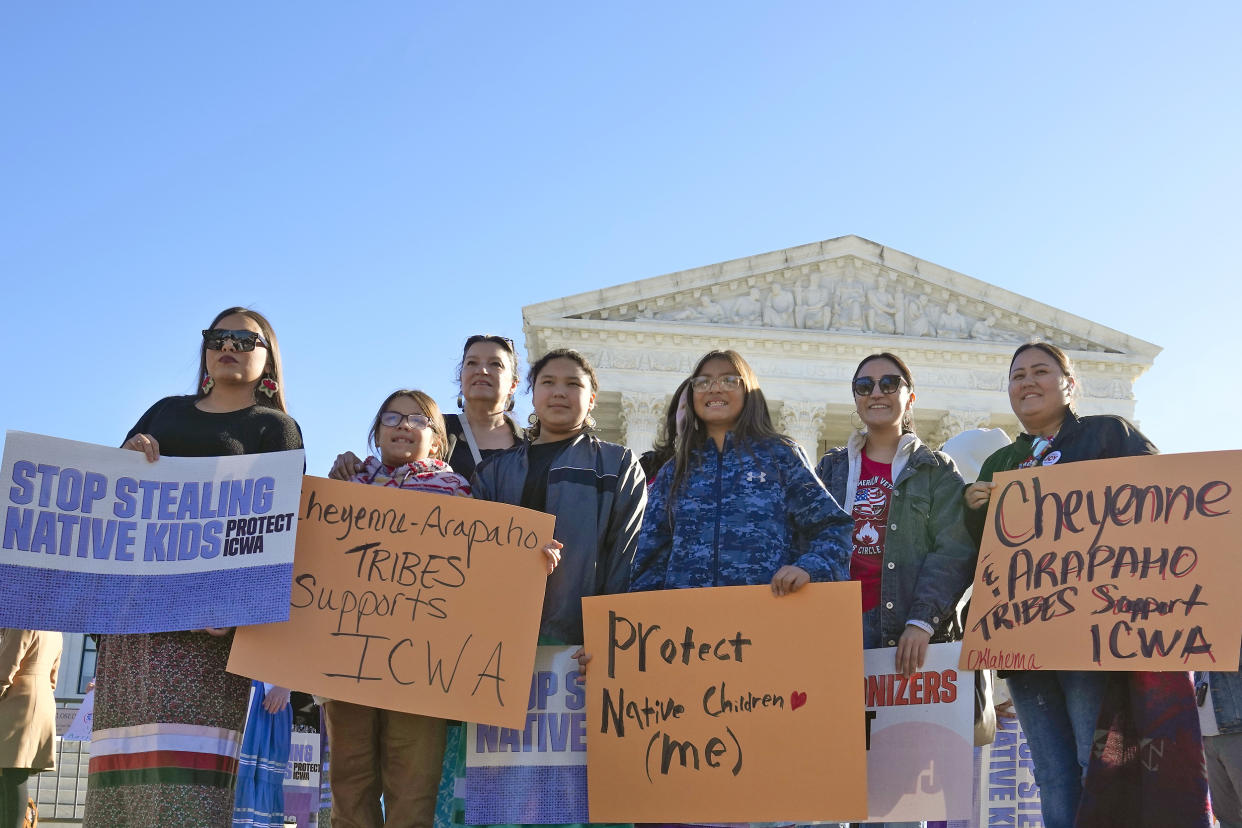Supreme Court’s Native American adoption ruling leaves door open to challenges that could threaten tribal sovereignty
Native American tribal leaders and legal experts celebrated a "resounding victory" Thursday after the Supreme Court left intact the federal law that gives preference to Native families in foster care and adoption cases involving Native children.
But some warned that the high court's 7-2 decision to uphold the landmark Indian Child Welfare Act of 1978 also leaves the door open to future challenges — and could threaten tribal sovereignty — because it does not address whether the law violates the equal protection clause of the Constitution. Ratified after the Civil War in 1868, the clause generally prohibits discrimination based on race, gender and other attributes.
"Reading the decision, there are still some vulnerabilities to not only a future challenge to ICWA but to other statutes and legal principles that really establish a foundation of the government-to-government relationship with the United States and Indian tribes. And so, we've got to stay vigilant," said Chuck Hoskin Jr., the principal chief of the Cherokee Nation, one of the nation's largest Native American tribes.
"But I think, for now, we're very satisfied that this was a really solid win for an important law," he said.

Supporters say the Indian Child Welfare Act remains critical to ensuring Native children are bound to their traditions and customs while reversing decades of federal and state governments' forced removal of them from their homes to assimilate them into an English-speaking, Anglo-centric society.
Mary Kathryn Nagle, a Cherokee attorney for the National Indigenous Women's Resource Center who filed a brief in support of the law, lauded the decision as a "resounding victory for Indian Country, for tribes and for Native children."
"It's a huge victory — I'd put it right up there with the victory in McGirt," Nagle said of the narrow Supreme Court ruling in 2020 that affirmed Native American rights in Oklahoma. "What the Supreme Court is signaling here is 'we're not rewriting the Constitution.' Instead, the court is standing on the side of hundreds of years of precedent and a clear message that the attacks on tribal sovereignty are bogus."
The challenge against the act before the Supreme Court was led by Chad and Jennifer Brackeen, a white evangelical Christian couple from Fort Worth, Texas, who began caring for a 10-month-old Native child in 2016. They moved to adopt him after his placement with a Navajo Nation family fell through. The couple then sought to adopt his half-sister, whose birth mother is Navajo, but were opposed by the tribe, prompting a legal battle.
The states of Texas, Indiana and Louisiana joined in the litigation against the federal government, which was defended by Interior Secretary Deb Haaland, the first Native American to serve as a Cabinet secretary.
Conservative legal groups have argued that the law is unconstitutional and illegal federal policy, because, they say, it allows for custody based on race. In addition, they say, the law gives the federal government too much control over states, which typically oversee adoption and foster cases.
Tribes assert that their rights to have precedence in such cases under the law are based on their protected political status, not because of racial identities, and that the decision upholds the U.S. government’s responsibility to continue engaging with tribes on a nation-to-nation basis.

"Sometimes outside organizations will always think they know what's best for you," Navajo Nation President Buu Nygren said. "But I think this is a day where ICWA stands and the Supreme Court says, 'You know what, Native people are more than capable of making their own decisions.'"
He added that by siding with the Indian Child Welfare Act, seven of the justices made "sure that we can control our own destiny and all tribal communities to make sure that we can take care of our own kids. Give us the first right to protect our kids, to raise them, to make sure that they're culturally still connected to our tribe."
Two of the six conservative justices, Clarence Thomas and Samuel Alito, dissented from the majority.
Writing for the majority, Justice Amy Coney Barrett said the challengers did not have legal standing to contest whether the preference for Native families to adopt Native children violates the equal protection clause of the 14th Amendment.
Justice Brett Kavanaugh wrote in a concurring opinion that the racial preference issue remains a "serious" question that the court should decide in a subsequent case.
"Those scenarios raise significant questions under bedrock equal protection principles and this Court's precedents," he wrote. "Courts, including ultimately this Court, will be able to address the equal protection issue when it is properly raised."
Matthew McGill, a lawyer representing the Brackeens, said he plans to pursue the race discrimination claim in the adoption proceedings in state court.
"Our main concern is what today's decision means for the little girl, Y.R.J. — now 5 years old — who has been part of the Brackeen family for nearly her whole life," McGill said in a statement. "The Court did not address our core claim that ICWA impermissibly discriminates against Native American children and families that wish to adopt them, saying it must be brought in state court."
The issue of Native children displaced from families and overrepresented in the foster care system also remains a larger concern, advocates say.
Most Native children who are in state foster care systems are placed with non-Native families, according to government data analyzed by Frank Edwards, an assistant professor and sociologist at Rutgers University-Newark in New Jersey who has written about the issue.
Sarah Kastelic, the executive director of the nonprofit National Indian Child Welfare Association, said that while adoption and foster care cases can be emotionally fraught for all involved, the Indian Child Welfare Act has been an invaluable tool for Native rights.
"We need to think about what's going to equip this child who is going to have to deal with different forms of adversity in many ways and what kinds of teachings and values will help to raise a healthy Native child," Kastelic said. "Is that going to happen in a non-Native home?"
Brad KillsCrow, the chief of the Delaware Tribe of Indians, which won its own child welfare dispute in the West Virginia Supreme Court this week, said the decision Thursday is a relief for him and other tribal groups, because the federal government is willing to "hold its end of the stick."
"We hold our culture very, very dearly to us," KillsCrow said, adding, "Our children are our future, and for us to be a tribe, to exist in the future, we've got to protect our children, and we've got to protect them at all costs."
